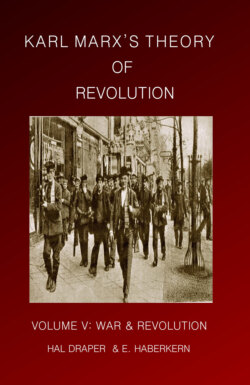Karl Marx’s Theory of Revolution Vol V

Реклама. ООО «ЛитРес», ИНН: 7719571260.
Оглавление
Hal Draper. Karl Marx’s Theory of Revolution Vol V
KARL MARX’S THEORY OF REVOLUTION. VOLUME 5 — WAR & REVOLUTION
FOREWORD
THE COVER DESIGN
ACKNOWLEDGMENTS
A NOTE ON STYLE
TABLE OF CONTENTS
INTRODUCTION
1. The “Revolution” of August 14, 1914
2. Lenin, Potresov and Kautsky
3. Three Epochs
4. “No Other Question Could Have Been Posed”
5. Two Barking Dogs
6. What Engels Did and Didn’t Say
CHAPTER 1. WAR AND THE DEMOCRACY IN 1848
1. War and Revolution 1793-1848
2. The Main Enemy
3. A Nation That Oppresses Others Cannot Itself Be Free
4. War With Russia
5. “Sea-Girt Schleswig-Holstein”
6. Hungarians and Poles
7. The Old Poland and the New
8. Revolutionary Cattle Dealers
9. The Workers Have No Country
CHAPTER 2. “NON-HISTORIC” PEOPLES
1. Twenty Vendées
2. Hegel on “Residual Fragments of Peoples”
3. The “Non-Historic” Czechs
4. “Counterrevolutionary Peoples”
5. Bakunin’s ‘Völkisch’ Nationalism
6. Democratic Pan-Slavism
7. The Right of Self-determination
CHAPTER 3. THE SIXTH POWER
1. Marx’s “Russophobia”
2. First Impressions
3. The Revolutionary Side
4. The Peace Party in England
5. The Russian Menace
6. Two Ex-Revolutionaries
7. The “Sixth Power”
CHAPTER 4: PULLING THE PLUG
CHAPTER 5. “THE DESPOTS OF ALL COUNTRIES ARE OUR ENEMIES”1
1. The 1870 Split in the German Social Democracy
2. Marx and Engels’ ‘Defensism’
3. Marx and Engels’ ‘Change of Position”’
4. Marx’s ‘Pro-Prussianism’
5. The “Neutrality Spirit’
6. The Trouble With Wilhelm Liebknecht
7. Engels’ Attack on Liebknecht
8. Marx’s Reply to Engels
9. The Letter to the Brunswick Committee
10. What Changed at Sedan
11. Postscript
12. “How to Fight the Prussians”
13. Treason
CHAPTER 6. BURYING THE ‘TSARIST MENACE’
1. The Danger of War
2. The Tsarist Threat
3. Engels’ 1891 “Prowar” Aberration
4. The Tsar Learns to Sing the Marseillaise
5. The Dispute With Bebel
6. The French Reaction
7. A New Stage of Capitalism?
8. Internment
CHAPTER 7. BURNING DOWN THE EMPEROR’S PALACE
1. Can Europe Disarm?
2. The Army of the Revolution
3. “. . . and the German Army Is Ours”
4. The Fight Over The Class Struggles in France
SPECIAL NOTE A: ROSDOLSKY VS. ROSDOLSKY
1. Marx and Engels on 1846
2. Two Diversions
3. The Neue Rheinische Zeitung and the Jews
4. Rosdolsky: 1929 and 1948
SPECIAL NOTE B. “CONSTITUTIONAL” OR “REVOLUTIONARY” WAR?
1. Lincoln and Slavery
1. The Abolitionists in Charge
2. Marx on the Secession Crisis
3. Lincoln’s Fear of Revolution
4. Marx as commentator on the American Civil War
5. Why?
SPECIAL NOTE C:THE LINCOLN MYTH
SPECIAL NOTE D: ENGELS’ “LAST TESTAMENT”: A TRAGICOMEDY IN FIVE ACTS
1. Richard Fischer and Other False Friends
2. Enter Wilhelm Liebknecht Stage Right—Stumbling
3. Enter Bernstein—Twirling a Long Black Mustache
4. D. Riazonov Discovers Engels’ Original Draft
5. The Communists vs. the Socialist Labor Party—Comic Relief
LIST OF ABBREVIATIONS
BIBLIOGRAPHY
NOTES. INTRODUCTION
CHAPTER 1
CHAPTER 2
CHAPTER 3
CHAPTER 4
CHAPTER 5
CHAPTER 6
CHAPTER 7
SPECIAL NOTE A: ROSDOLSKY V. ROSDOLSKY
SPECIAL NOTE B: “CONSTITUTIONAL” OR “REVOLUTIONARY” WAR?
SPECIAL NOTE D: ENGELS’ “LAST TESTAMENT”—A TRAGICOMEDY IN FIVE ACTS
INDEX
Отрывок из книги
KARL MARX’S THEORY OF REVOLUTION
VOLUME V — WAR & REVOLUTION
.....
Marx and Engels addressed two meetings of “the Democracy” memorializing Polish insurrections in the year preceding the Manifesto. The first was in London on November 29, 1847; the occasion was the seventeenth anniversary of the 1830 uprising. On this occasion, neither Marx nor Engels had much to say about Poland! They mainly took the opportunity to emphasize the international and social character of the coming revolution. Engels’ only reference to Poland emphasized the responsibility of Germans to oppose the German occupation of Poland and went on to stress the international character of the movement. It was Marx who “internationalized” the issue of Polish independence and emphasized its relation to the “social question.”
The old Poland is lost in any case and we would be the last to wish for its restoration. But it is not only the old Poland that is lost. The old Germany, the old France, the old England, the whole of the old society is lost. But the loss of the old society is no loss for those who have nothing to lose in the old society, and this is the case of the great majority in all countries at the present time.27
.....